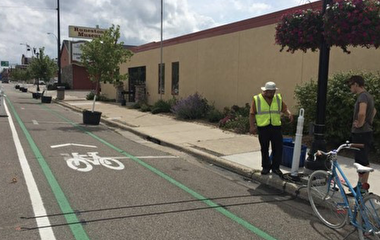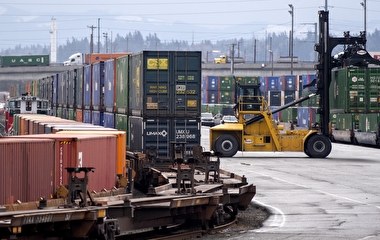In a new $1.5 million project funded by the US Department of Energy (DOE), U of M researchers will aim to increase the driving range and lower the operating costs of electric heavy-duty delivery vehicles.
The three-year project, titled Improving the Freight Productivity of a Heavy-Duty, Battery Electric Truck by Intelligent Energy Management, will focus on large-scale battery electric vehicles (BEVs)—in this case, semitrucks—that typically travel more than 250 miles each day between warehouses.
Vehicle manufacturer Volvo Group North America is leading the overall $3.8 million project and providing equipment—two full-size battery electric Class 8 tractors—along with engineering integration and data collection.
The U of M research team will be led by mechanical engineering professor Will Northrop of the T.E. Murphy Engine Research Laboratory and computer science professor Shashi Shekhar, with assistance from Ph.D. student Matt Eagon.
Minnesota-based Murphy Warehouse Company and Texas-based HEB Companies will serve as fleet partners, providing operating sites that vary from extreme heat in the summer to extreme cold in the winter. Los Angeles-based Greenlots, a provider of electric vehicle charging and energy management technologies, will provide the charging stations.
The U of M team has been developing an intelligent energy management system (i-EMS) in a project funded by the DOE’s Advanced Research Projects Agency–Energy that is focused on extending the range of medium-duty hybrid-electric delivery vans. This new Volvo i-EMS project will build on that work, developing algorithms for battery-electric trucks and improving the energy management performance for the Volvo FE electric Class 8 tractors—and subsequently, regional freight movement.
Northrop says he is excited to extend the i-EMS strategy to pure battery electric vehicles. “This is an opportunity to leverage our current research to improve the range and utility of electrified vehicles in Minnesota and beyond,” he says.
The i-EMS will use real-time vehicle and operations data, along with models, from Murphy Warehouse and HEB trucks to predict energy use based on load, ambient temperature, planned route, and real-time traffic conditions. The U of M researchers will then analyze fleet partners’ collected route data to determine optimal BEV routes to minimize energy use and predict the best locations for on-route charging of multiple BEV trucks, which could support future expansion of the BEV fleet.
Ultimately, the goal is to extend the driving range of the Volvo BEV trucks by 20 to 30 percent compared to the baseline and to improve operating cost efficiency by 50 percent.
Cory Milczark, director of operations for Murphy Warehouse, will be overseeing the project with the firm’s transportation department. Milczark says the company has always been committed to cutting-edge technology and environmental sustainability, so the project seemed like a natural fit. While Murphy currently uses battery-electric forklifts, “We would be interested in using electric trucks if they are successful,” Milczark says.



